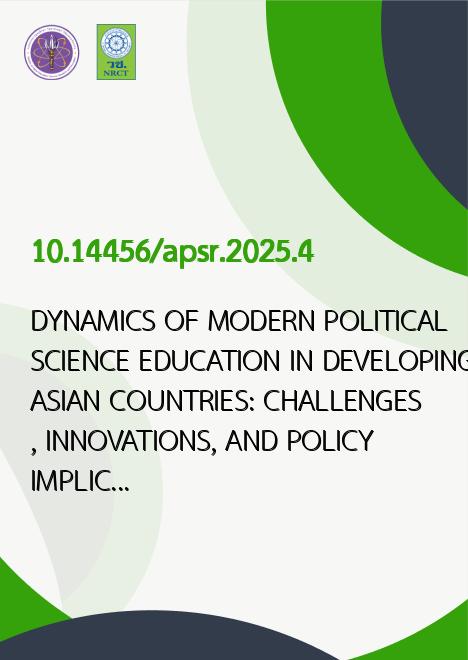
|
DYNAMICS OF MODERN POLITICAL SCIENCE EDUCATION IN DEVELOPING ASIAN COUNTRIES: CHALLENGES, INNOVATIONS, AND POLICY IMPLICATIONS |
|---|---|
| รหัสดีโอไอ | |
| Creator | Kittisak WONGMAHESAK |
| Title | DYNAMICS OF MODERN POLITICAL SCIENCE EDUCATION IN DEVELOPING ASIAN COUNTRIES: CHALLENGES, INNOVATIONS, AND POLICY IMPLICATIONS |
| Contributor | Jamaluddin AHMAD, Ahmad MUSTANIR |
| Publisher | Asian Political Science Review |
| Publication Year | 2568 |
| Journal Title | Asian Political Science Review |
| Journal Vol. | 9 |
| Journal No. | 1 |
| Page no. | Article 4 |
| Keyword | Political Science Education, Developing Asian Countries, Civic Engagement, Policy Making, Curriculum Development |
| URL Website | https://so01.tci-thaijo.org/index.php/APSR |
| Website title | https://so01.tci-thaijo.org/index.php/APSR/article/view/277686 |
| ISSN | 2730-3624 |
| Abstract | This review explores the state of political science education in developing Asian countries, emphasizing its importance in enhancing civic engagement and guiding policy-making. Through an extensive literature review and analysis of case studies from top institutions, the study identifies significant obstacles, such as insufficient resources, political interference, and a scarcity of qualified faculty, which impede program effectiveness. Successful political science programs are characterized by innovative curricula incorporating local contexts, experiential learning opportunities, and community involvement. Case studies from the National University of Singapore and the University of the Philippines provide examples of best practices in cultivating critical thinking and civic responsibility among students. The review suggests several improvements: enhancing the relevance of curricula, investing in faculty development, encouraging civic engagement activities, using technology to improve learning, and reducing political interference to safeguard academic freedom. By adopting these strategies, political science education can better equip students to become knowledgeable citizens and effective policymakers, thereby supporting the growth of democratic values and practices. This study highlights the essential role of political science education in fostering active and engaged citizens and the necessity of educational reform in the region. |
